Smart Home Hub, All You Need to Know in 2023




Imagine configuring a command that turns on the air conditioning system before you arrive, triggers the garage door to open, illuminates the house, and plays classical music as the owner reaches home—all made possible with the smart home hub.
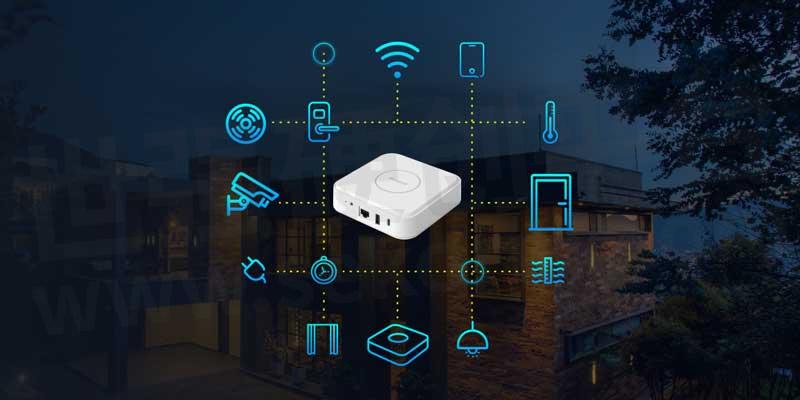
The article provides a unique perspective on smart home hubs, focusing on their relevance and potential for enterprises. Dusun IoT, a leading manufacturer, brings an insider’s insight to explore the complex workings of smart home hubs and their role in the evolving landscape of smart home automation.
Smart Home Protocols to Facilitate Device Communication
Protocols facilitate the transmission of signals between smart home devices to communicate and initiate actions such as controlling the lighting system. Smart home devices must connect to the same network as their central home automation hub for proper operation. The most common smart home protocols are:
Zigbee
Zigbee 3.0 is a widely adopted standard that promotes interoperability among different Zigbee devices. It allows manufacturers to create home hubs that support a wide range of Zigbee devices, enhancing user experience.
Z-Wave
Z-Wave 700 is the latest version of the Z-Wave protocol. It shows improved performance, longer range, and extended battery life compared to previous versions. Enterprises can consider integrating Z-Wave 700 or Plus support into their smart home hubs for users who prefer Z-Wave devices.
Zigbee vs. Z-Wave: Zigbee typically offers broader compatibility with various devices, while Z-Wave often possesses better signal reliability and less interference. Enterprises can capitalize on this by developing smart home hubs that support Zigbee and Z-Wave devices, allowing customers to mix and match devices from different ecosystems.
Bluetooth
Bluetooth is getting popular for smart home gadgets because of its availability in smartphones and other consumer electronics. Bluetooth-enabled devices often do not require a home hub, as they can connect directly to smartphones or act as smart hubs. However, for certain use cases where centralized control and automation are desired, multi-protocol smart home hubs can also include Bluetooth support. It allows customers to integrate their Bluetooth smart home gadgets into a larger ecosystem alongside other protocols like Zigbee and Z-Wave.
Wi-Fi
WiFi is now part and parcel of our daily lives. Many smart home devices utilize WiFi for easy connectivity and cloud-based control. Although WiFi does not require a hub for individual device control, enterprises can include WiFi support in their multi-protocol smart home hubs to offer a comprehensive solution that covers a wide range of devices.
Home Automation Platforms
The home automation platforms act as the central control software for your smart hubs, providing you with an interactive user interface to monitor and control all your devices. It empowers you to set up automation, scenes, routines, and schedules, granting full control over your smart home ecosystem.
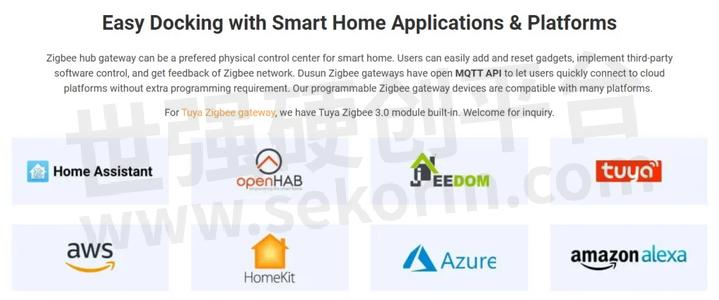
Selecting the right home automation system is crucial as it determines your smart home’s overall look and functionality. The following is a list of some popular smart home platforms of 2023.
Home Assistant
SmartThings
Tuya Smart
Apple HomeKit
Google Assistant
Amazon Alexa
Hubitat Elevation
Wink
OpenHAB
Homebridge
Locally Controlled Hubs vs. Cloud-Managed Hubs
The decision between a locally controlled and cloud-managed home hub depends on individual preferences and specific use cases. Users prioritizing privacy, security, and local control may prefer locally controlled smart hubs. On the other hand, those seeking convenience, remote access, and scalability may opt for cloud-managed hubs. Hybrid solutions that combine both approaches may also be viable, offering the best of both worlds. A brief comparative analysis of local smart home hubs and cloud-based home automation hubs follows.
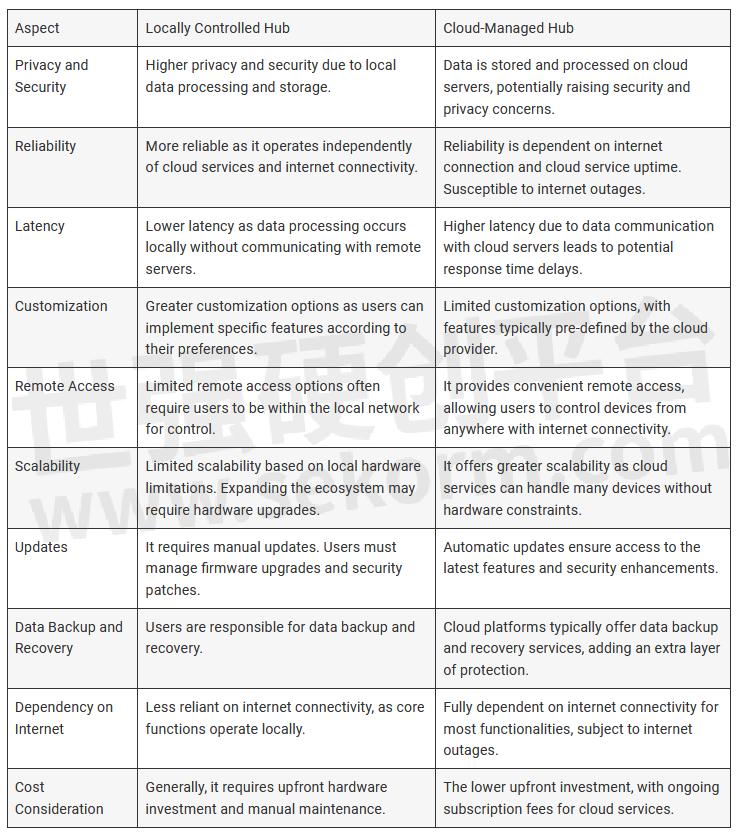
Smart Home Hub Development
Smart home hub development involves creating a centralized control and communication system that seamlessly integrates with various smart devices and protocols, enabling users to manage and automate their smart home ecosystem. The development process includes hardware selection, firmware programming, cloud connectivity, user interface design, security implementation, and integration with popular smart home platforms. This results in a feature-rich, user-friendly, and best smart home hub that enhances the overall experience.
Why develop a smart home hub?
Developing a smart home hub allows businesses to enter a growing market, provide enhanced user experiences, and create a unique brand identity. Custom wireless technology solutions, such as custom routers or smart home hubs, are becoming popular for organizations looking to transform their businesses with wireless technology and IoT deployments.
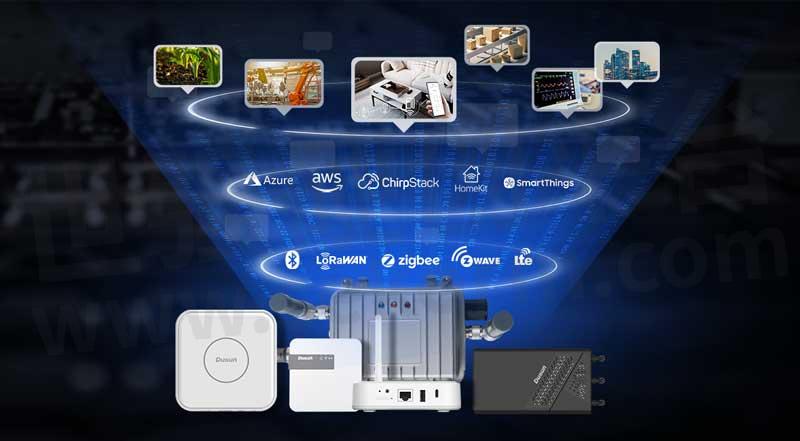
Custom solutions are particularly attractive when organizations have unique requirements, specific regulatory needs, extended product lifecycles, or a desire for full control and competitive advantage. IoT solution providers shall prefer custom smart home hubs over generic hubs for the following key factors.
Regulatory Compliance
Highly regulated industries like medical applications may require custom solutions to meet specific regulatory standards, like the IEC 60601 standard for medical devices.
Extended Lifecycle
Certain industries, like medical devices, need products with a longer lifecycle. Custom routers or gateways can be designed for extended product life spans, especially when using System on Modules (SOMs).
Full Control
Organizations may opt for custom solutions to have complete control over product design and intellectual property, allowing them to tailor the product to their needs.
Competitive Advantage
Custom niche products with unique properties can offer organizations a competitive edge in the market, such as customized indicators, data speed, edge computing, wireless protocol flexibility, and more.
Is it a good option to use Raspberry Pi to develop a smart home hub?
Using a Raspberry Pi to develop a smart home hub can be a good
option, especially during development. Raspberry Pi offers a series of
single-board computers popular among electronics enthusiasts and
developers. Some of its advantages are:
Learning and Prototyping: Raspberry Pi facilitates smart home hub experimentation and learning, enabling hands-on experience in building smart home systems.
Flexibility: Raspberry Pi’s open-source nature allows customization with sensors, actuators, and communication protocols for tailored smart home hubs.
Low Cost: Raspberry Pi boards offer affordability, making them cost-effective for developers and small-scale projects.
Vast Community and Resources: The extensive Raspberry Pi community provides abundant online resources, tutorials, and support to assist developers in addressing challenges.
However, using the Raspberry PI gateway throughout the product’s development stage is quite handy. However, the productization step has a tremendous amount of effort. The productization stage requires the following three stages: mechanical and ID design for mass manufacture, PCB board redesign for mass manufacture, and application for certification, which will result in significant investment in productized design.
Dedicated Smart Home Hubs
Smart Home Hubs are central control devices that simplify the user experience and provide a single platform for managing and controlling smart home systems from different manufacturers and communication protocols. A dedicated smart home hub is a specialized device for one particular application. A few examples are given below.
Light switch hub
A smart switch hub is designed to control and manage smart light switches and bulbs. It allows users to remotely turn lights on/off, adjust brightness, and create automated lighting schedules. Commonly used protocols for light switch hubs include Zigbee, Z-Wave, and Wi-Fi.
Thermostat hub
A thermostat hub centralizes control of smart thermostats. It enables users to remotely set and adjust heating and cooling schedules, monitor temperature, and create energy-efficient automation. Smart hub thermostats typically utilize protocols like Zigbee, Z-Wave, and Wi-Fi.
Smart blinds hub
A smart blinds hub is a dedicated hub that integrates and controls smart blinds. It allows users to open remotely or close blinds, set timers for automated adjustments, and manage natural light and privacy. Such smart motion blind hubs often use communication protocols such as Zigbee, Z-Wave, and Bluetooth.
Things to Consider When Selecting the Best Smart Home Hub
Selection of the best smart home hub is a crucial task. Therefore, it is recommended to consider the following key factors in this process.
CPU: Select low-energy consumption and high-efficiency computing processors to ensure smooth and reliable performance.
Operating System: Choose a hub that supports popular OSs like Linux, OpenWrt, Ubuntu, Debian, or Android for flexibility and compatibility with various applications. The smart hub must also be compatible with the mobile device’s operating system, whether iOS or Android.
Smart Home App: Check if the home hub offers a user-friendly smartphone app for convenient control and management of your smart home devices. Some smart hubs may also provide PC or Mac compatibility for additional flexibility.
Voice Control: Check if the home hub integrates with your smart speaker (e.g., Amazon Alexa or Google Home) for convenient voice control of your smart home system.
Programmability: Ensure the home hub allows full control over the hardware, enabling you to write custom automation rules and not rely solely on third-party solutions.
Firmware Redevelopment and Assistance: Look for smart hubs offering firmware redevelopment options and providing technical support to customize the device for your needs.
Firmware OTA (Over-the-Air): A home hub with OTA capability enables remote firmware updates, enhancing security and ensuring the latest features are accessible.
Multi-connectivity: Ensure the smart home hub supports various communication protocols, such as RJ45 (Ethernet), Wi-Fi (2.4G/5G), LTE 4G, BLE, Zigbee, Z-Wave, and Matter, for seamless integration with different smart devices from multiple manufacturers.
Enclosure Design: Consider an aesthetically pleasing enclosure design, as an attractive appearance appeals to customers, especially the younger generation.
Customization Ability: Look for a smart home hub that allows customization, which will help differentiate your product and make it stand out in the market.
User Experience: Choose a home automation hub with a user-friendly interface, reducing the need for extensive customer education and enhancing sales potential.
Stability: Ensure the smart hub offers a stable RF signal, local control performance, and battery backup in case of power outages.
Maximum Connected Devices: Cross-check the maximum number of devices the home hub can connect with your required number of devices.
Other Ports: Consider additional ports like USB and HDMI for enhanced versatility and expandability.
Matter Support: Verify if the smart hub supports Matter (formerly Project CHIP) for future interoperability with various smart home devices.
Security: Look for built-in hardware encryption, such as ECC608, to ensure data security and protect against potential vulnerabilities.
Future-Proof: Choose a home hub equipped to handle future updates and advancements in smart home technology.
Certification: Prefer smart hubs that come with pre-certification, as it helps expedite the product’s time-to-market and ensures compliance with industry standards.
FAE Technical Support: Ensure the manufacturer provides reliable technical support to address any issues promptly and efficiently.
Smart Home Hub Recommendation
A well-chosen smart home hub can elevate your living experience by bringing convenience and automation to every corner of your home. Here we recommend a few best smart home hubs.
The most affordable smart home hub: DSGW-030
If you’re looking for an affordable smart home hub, the DSGW-030 is an excellent recommendation. It supports the latest Bluetooth 5.2 and Zigbee 3.0 protocols. Its compact design makes it fit into any space effortlessly, making it suitable for multiple smart homes and IoT projects.
Programmability and easy integration with public and private clouds offer flexibility in developing custom home automation applications. With multiple API interfaces and SDK support, users can easily create firmware and automation rules, making it a reliable and customizable solution for smart home needs.

Smart home hub with ESP32: DSGW-092
The ESP32 SoCs are highly regarded for their excellent RF performance, making them reliable for wireless communication, and their ultra-low power consumption ensures energy efficiency. Being small and running on FreeRTOS, ESP32 makes development easy and seamless.
Developers can use the SDK Quick Start guide and API to quickly set up the home hub and create smart home automation applications. With its diverse capabilities and user-friendly features, the DSGW-092 ESP32 gateway is a popular choice for building smart home hubs.
The most popular smart home hub: DSGW-210
The DSGW-210 is a popular and versatile smart home hub with a visually appealing design and powerful performance. Its advanced features make it suitable for various IoT applications, including smart home automation, building automation, and energy management.
With fully-documented development resources and support for self-owned and custom software applications, the DSGW-210 stands out as a top choice for IoT hardware developers seeking a robust and customizable solution. Jeedom, an IoT hardware solution provider, has utilized DSGW-210 in its top-of-the-line product Jeedom Luna and they claim it as their best smart home hub.
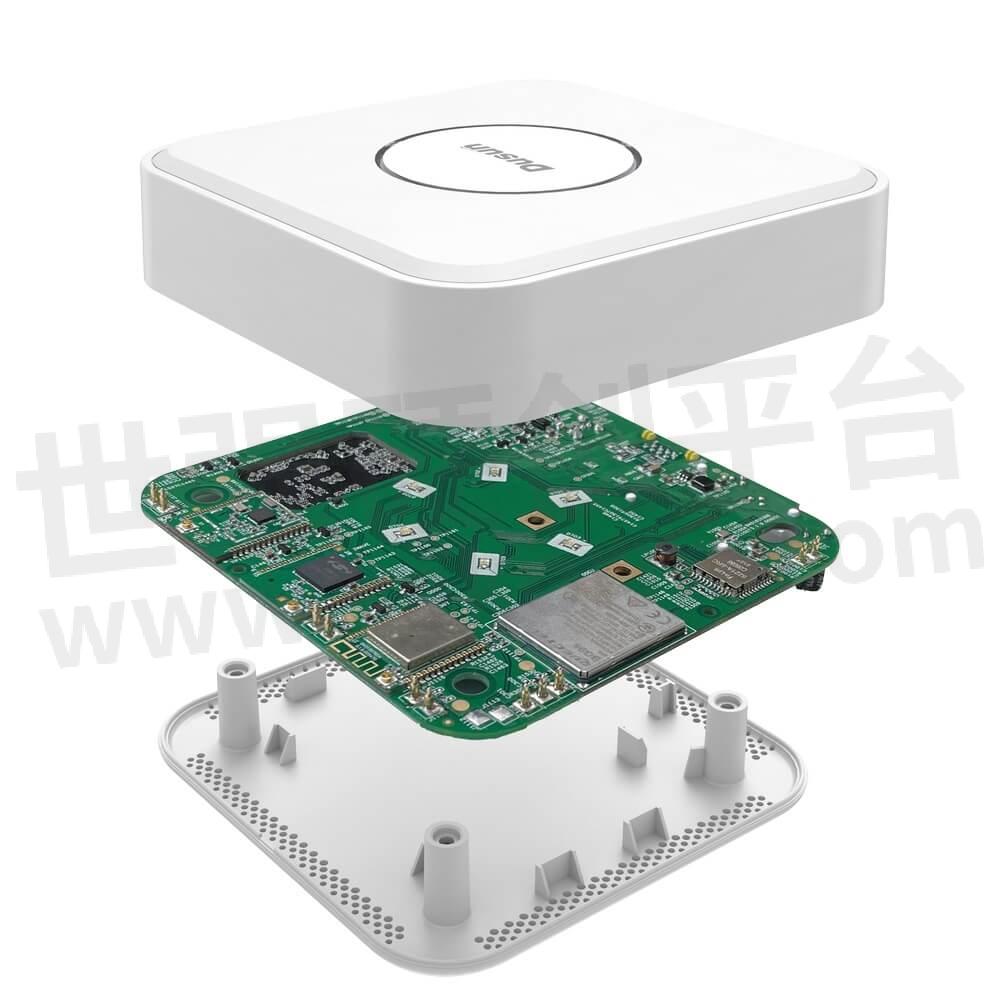
Touch screen smart home hub: DSGW-120
The DSGW-120 Smart Touch Panel Gateway is a feature-rich control panel designed to enhance the smart home experience. Powered by a PX30 Quad Core ARM Cortex-A35 processor, it offers seamless management and optimization of all connected devices from a single location.
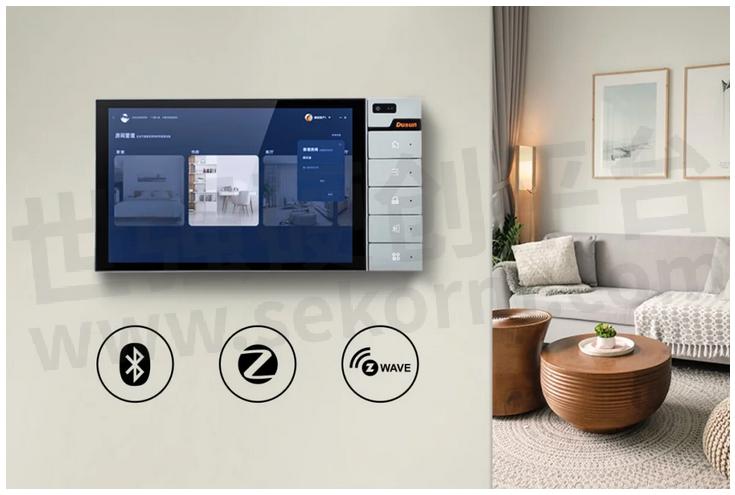
It provides convenient control options with support for multiple protocols like Zigbee and Z-Wave and a voice function. Its high programmability and comprehensive documentation allow for easy secondary development, enabling the creation of custom applications to meet specific needs. Ideal for IoT gateway developers, the DSGW-120 is a compelling and handy solution for smart home automation.
- |
- +1 赞 0
- 收藏
- 评论 0
本文由出山转载自Dusun Blogs,原文标题为:Smart Home Hub, All You Need to Know in 2023,本站所有转载文章系出于传递更多信息之目的,且明确注明来源,不希望被转载的媒体或个人可与我们联系,我们将立即进行删除处理。
相关推荐
Industrial Gateway, IoT Gateway, and PLC Gateway: Bridge Connecting the Intelligent Future
In the era of Industry 4.0 and the booming Internet of Things (IoT), industrial gateways, IoT gateways, and PLC gateways, as key technologies, are gradually becoming important forces in promoting the transformation and upgrading of traditional industries. These gateways are not only bridges connecting the physical and digital worlds, but also core hubs for achieving intelligence, automation, and remote monitoring.
Why Do IoT Gateways Need Edge Computing Capabilities?
The IoT gateway requires edge computing capabilities to address challenges in real-time performance, bandwidth, cost, data security, and device resources. Edge computing has broad application prospects in areas such as smart manufacturing, smart cities, smart agriculture, smart logistics, and smart healthcare.
Networking Solutions and Benefits of Industrial IoT Gateway in Traditional Industries
Industrial IoT Gateway offer flexible and scalable networking solutions that enhance interoperability, data management, security and cost-efficiency in traditional industries. This article delves into the networking schemes employed by Industrial IoT Gateway and the advantages they bring to traditional industries
Dusun IoT’s DSGW-210-HA Home Assistant IoT Gateway Operating System Upgrade to Debian 12
Dusun IoT’s DSGW-210 Home Assistant Zigbee Z-Wave Gateway now fully supports the Debian 12 operating system, enhances developer’s Linux IoT experience with fixed bugs and feature improvements, providing a robust IoT gateway platform and a smoother operation to leverage the capabilities that Home Assistant brings to your service.
DSGW-230物联网边缘计算机网关SDK快速入门指南
描述- 本指南为IoT边缘计算机网关DSGW-230的SDK快速入门,内容包括网关信息、目标设置、编译环境搭建、SDK获取与准备、代码编译、更多关于buildroot系统、无线开发(Zigbee、Z-Wave、BLE、LoRaWAN)、图像升级和电源管理配置等。指南旨在帮助开发者快速上手,创建基于DSGW-230的应用程序。
型号- DSGW-230
USR-N720-ETH USR-N720物联网网关
描述- USR-N720是一款高性能边缘计算数采网关,具备边缘数据采集、协议转换、快速上云和数据加密等功能,适用于智慧医疗、智慧产线、智慧泵房、智慧工厂、智慧电力、智慧畜牧等多种工业智能化方案。
型号- USR-N720
Sierra Wireless(司亚乐)GL系列IoT网关选型指南
型号- GL SERIES,GL7500,GL7600,GL7611,GL7812,GL7605
Custom IoT Hardware for Smart Hom Hub Controller Box
It will show you details of how Dusun IoT, an original IoT gateway hardware provider, offers Z/IP gateway installed customized Z-wave firmware and passes the test by one of our smart home solution customers.
USR-N720-C1 USR-N720物联网网关
描述- USR-N720是一款高性能边缘计算数采网关,具备边缘数据采集、计算、协议转换、快速上云和数据加密等功能。产品采用RISC-V内核,支持双网络、双串口,适用于智慧医疗、智慧产线、智慧泵房、智慧工厂、智慧电力、智慧畜牧等多种工业智能化方案。
型号- USR-N720
Custom Smart Home Hub with DSGW-210 IoT Gateway,a Backup Solution of Raspberry Pi 3
DSGW-210 (Dusun Pi 3+) is an IoT edge-computing gateway that supports multiple operating systems and wireless protocols for flexible selection, which is a backup solution of Raspberry Pi 3 to help customer develop their own IoT devices in a cost-effective way.
How to Secure the Smart Gateway?
Security is one of the biggest challenges and we must find a way to secure those IoT gateway devices. In this article, SKYLAB will find out how to make these devices secure.
Model 98019-IG 物联网闸道器平台 IoT Gateway
描述- 该资料介绍了Chroma IoT Gateway Model 98019-IG,一款低成本、高性价比的工业自动化通讯软件,具备内置OPC通讯协议、高信息安全OPC UA、简单接口操作等特点,适用于物联网、工业自动化等领域,解决工业网络间的复杂数据通信问题。
型号- 98019-IG,MODEL 98019-IG
Dusun网关选型表
Dusun提供智能家居网关选型,内置无线模块化模块,允许用户根据需要混合搭配组件。包括 Zigbee、Z-wave、蓝牙 BLE、Wi-Fi、Matter、OpenThread 等。无配置或编程要求,即插即用,易于使用。开放API,支持MQTT、HTTP、TCP、UDP、uTP,快速连接私有云平台。
|
产品型号
|
品类
|
运行温度(℃)
|
工作湿度
|
电源
|
IP等级
|
|
DSGW-030-1(64MB+16MB)
|
智能网关
|
0℃~40℃
|
10~90%(不凝结)
|
输入:AC 100V~240V 50-60Hz,输出:DC 5V/1A Micro USB
|
-
|
选型表 - Dusun 立即选型
Sierra Wireless(司亚乐)FX30系列IoT网关选型指南
目录- Programmable IoT Gateway Accessories Certification
型号- 6001155,6001156,FX30S,6001090,6001128,FX30 LTE CAT- 1 NAM,FX30 LTE CAT- 1 EMEA,6001158,FX30
IOT Sensor Monitoring System Gateway IOT-G010
IoT sensor monitoring system gateway IOT-G010 is mainly used for sensor monitoring and control of the Internet of Things. The whole network system is composed of gateway IOT-G010 and node IOT-N010/ IOT-THS010, which uses a wireless star network combined with Mesh networking. A good coordination mechanism and precise scheduling algorithm are used internally between the node and the gateway to avoid collisions between data packets in the air.
电子商城
品牌:MELEXIS
品类:LIN-to-LIN Gateway/LIN RGB Controller
价格:¥26.1114
现货: 62
品牌:MELEXIS
品类:LIN-to-LIN Gateway/LIN RGB Controller
价格:¥15.9315
现货: 0
服务
使用FloTHERM和Smart CFD软件,提供前期热仿真模拟、结构设计调整建议、中期样品测试和后期生产供应的一站式服务,热仿真技术团队专业指导。
实验室地址: 深圳 提交需求>
支持 3Hz ~ 26.5GHz射频信号中心频率测试;9kHz ~ 3GHz频率范围内Wi-SUN、lora、zigbee、ble和Sub-G 灵敏度测量与测试,天线阻抗测量与匹配电路调试服务。支持到场/视频直播测试,资深专家全程指导。
实验室地址: 深圳/苏州 提交需求>
































































































































































































登录 | 立即注册
提交评论